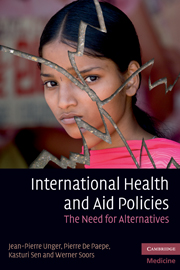Book contents
- Frontmatter
- Contents
- Preface
- Biographies
- Notices
- Acknowledgements
- List of abbreviations
- Reviews
- Introduction: Overview and purpose
- Section 1 Paradigms of international policies
- Section 2 The failure of the aid paradigm: poor disease control in developing countries
- Section 3 Impact of international health policies on access to health in middle-income countries: some experiences from Latin America
- Section 4 Determinants and implications of new liberal health policies: the case of India, China and Lebanon
- Section 5 Principles for alternative, publicly oriented health care policies, planning, management and delivery
- Section 6 A public health, strategic toolkit to implement these alternatives
- Conclusions
- Glossary
- Index
Section 4 - Determinants and implications of new liberal health policies: the case of India, China and Lebanon
Published online by Cambridge University Press: 06 December 2010
- Frontmatter
- Contents
- Preface
- Biographies
- Notices
- Acknowledgements
- List of abbreviations
- Reviews
- Introduction: Overview and purpose
- Section 1 Paradigms of international policies
- Section 2 The failure of the aid paradigm: poor disease control in developing countries
- Section 3 Impact of international health policies on access to health in middle-income countries: some experiences from Latin America
- Section 4 Determinants and implications of new liberal health policies: the case of India, China and Lebanon
- Section 5 Principles for alternative, publicly oriented health care policies, planning, management and delivery
- Section 6 A public health, strategic toolkit to implement these alternatives
- Conclusions
- Glossary
- Index
Summary
Introduction to Section 4
The three chapters in this section examine factors behind reforms of the health sector, most notably the financing of health services which, despite being undertaken over varying periods of time and in varied forms, retained the underlying common thread of rapid privatization and commercialization of health services. The approach to this section is an interdisciplinary one with historical, social, cultural and economic determinants of health reforms featuring in one or more of the chapters. In all three case studies the introduction of privatization whether of primary, secondary or tertiary care, has excluded large elements of the population from access to health care. In addition associated with this is a high risk of indebtedness and health related poverty, a phenomenon that is becoming increasingly widespread. All three countries also share regional variations in the experience of inequities with the urban employed having better access than the majority of the rural poor. Lebanon has the added burden of several decades of chronic conflict that has repeatedly affected its health infrastructure, in contrast to the rest of the Mashreq countries (generally speaking, the region of Arabic-speaking countries to the east of Egypt and north of the Arabian Peninsula) referred to in the chapter. In India the experience of financing will be varied by state, but the key-unifying factor is an almost complete absence of an evidence-base for donors and governments, from which policy decisions were made over the past two decades.
- Type
- Chapter
- Information
- International Health and Aid PoliciesThe Need for Alternatives, pp. 107 - 108Publisher: Cambridge University PressPrint publication year: 2010

